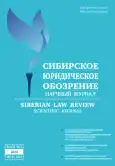The Legal, Explanatory, and Expert Aspects of the Concepts Utilized By Lawmakers in Enacting the Prohibition of LGBT Propaganda
- Autores: Medvedeva A.S.1,2
-
Afiliações:
- North-Western Forensic Science Center
- V. Serbsky National Medical Research Centre for Psychiatry and Narcology of the Ministry of Health of the Russian Federation
- Edição: Volume 21, Nº 2 (2024)
- Páginas: 251-262
- Seção: CRIMINAL LEGAL SCIENCES
- ##submission.datePublished##: 21.10.2024
- URL: https://journal-vniispk.ru/2658-7602/article/view/348926
- DOI: https://doi.org/10.19073/2658-7602-2024-21-2-251-262
- EDN: https://elibrary.ru/IEVZED
- ID: 348926
Citar
Texto integral
Resumo
The article analyzes new concepts introduced by Federal Law No. 478-FZ of December 5, 2022, such as propaganda of non-traditional sexual preferences, pedophilia and gender reassignment. The aim is to comprehend the significance of the mentioned categories and their potential ramifications on law enforcement practices and forensic activities. The meaning of these terms is primarily considered based on the sociocultural context. The assessment of the level of traditionalism regarding sexual preferences and gender-fluid behavior is conducted uniquely within specific societies, governed by their respective rules and norms. It is noted that the international and Russian societies hold qualitatively distinct attitudes toward these phenomena. Special attention is paid to the analysis of propaganda of the phenomena under consideration. It is noted that in Russian society, propaganda is not always correctly interpreted; often it is replaced by the categories of 'justification' and 'call to action,' which have different meanings. In particular, the category "pedophilia propaganda" is considered, the contradictory nature of the result of the joint use of these nominations is emphasized: if pedophilia is understood as a disorder of sexual preference, its propaganda is impossible. Based on this logical discrepancy, a conclusion is made about the possible need to amend criminal, criminal procedure and penal enforcement legislation. The author presents definitions for the three terms under discussion. Regarding the propaganda of non-traditional sexual preferences, pedophilia, and gender reassignment, the article's author proposes understanding it as the persuasion of the general audience in the validity and necessity of embracing corresponding ideologies. The potential for forensic expert engagement in detecting distinctive markers of propaganda related to the discussed phenomena is outlined. A three-stage algorithm for expert analysis is suggested: identifying the central theme of contentious content, discerning the author's stance and inclination towards shaping the audience's receptiveness to the declared viewpoint. The overarching conclusion is drawn that the enactment of laws prohibiting LGBT propaganda necessitates continued collaborative efforts among a diverse range of specialists. These efforts should be directed towards establishing a shared understanding of the new terms, addressing clinical, diagnostic, and legal challenges, and developing methodological frameworks to support law enforcement and expert activities.
Sobre autores
Anna Medvedeva
North-Western Forensic Science Center; V. Serbsky National Medical Research Centre for Psychiatry and Narcology of the Ministry of Health of the Russian Federation
Autor responsável pela correspondência
Email: 98765_89@mail.ru
ORCID ID: 0000-0002-0921-588X
Código SPIN: 8053-6926
Leading State Forensic Expert at the North-Western Forensic Science Center, Senior Researcher of V. Serbsky National Medical Research Centre for Psychiatry and Narcology of the Ministry of Health of the Russian Federation, Candidate of Psychological Sciences
Rússia, 8 Nekrasova st., St. Petersburg, 190000, 23 Kropotkinskii lane, Moscow, 119034Bibliografia
Arquivos suplementares












